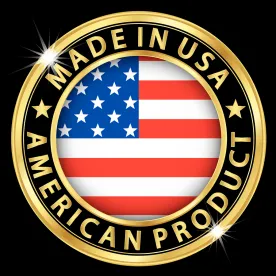On January 25, 2021, President Joe Biden issued an Executive Order entitled “Ensuring the Future is Made in America by All of America’s Workers,” which directs a broad review and strengthening of governmental procurement and financial assistance policies and regulations which require or provide a preference for goods, products or materials produced in the United States.[1] While US content must be disclosed on automobiles, textile, wool and fur products sold in the US[2] and there is no law which requires a company to disclose the amount of US content or that a product is manufactured in the US, manufacturers and retailers who make claims about the amount of US content in their products must comply with the “MADE IN USA” Enforcement Policy Statement issued by the Federal Trade Commission (“FTC”).[3] The Enforcement Policy Statement applies to all products advertised or sold in the US, except those specifically subject to country-of-origin labeling requirements and “MADE IN USA” claims, express and implied, that appear on products and labelling, advertising and promotional materials and other forms of marketing including digital marketing and social media.[4] In order to make an unqualified claim that a product is “MADE IN USA”, a manufacturer or marketer should have competent and reliable evidence (“a reasonable basis”) to support a claim that the product is “all or virtually all” made in the US.[5]
Gennex Media LLC, which is owned by Akil Kurji, does business under the names Brandnex, BrandStrong, PMGOA and Promotional Manufacturing Group of America. Gennex sells promotional products such as customized wristbands, lanyards, temporary tattoos and buttons. Gennex’s owner Kurji created all content and approved all changes to the Brandnex website, approved all of Gennex’s social base content, and created and approved Gennex’s YouTube content.[6]
On March 1, 2021, the FTC announced that it had prepared an administrative complaint which charged that Gennex and Kurji had made false, misleading or unsupported advertising claims that the Brandnex products were all or virtually all made in the US. The complaint alleged that, since at least 2012, Gennex and Kurji violated the FTC Act by claiming on the Gennex website that the products they sell are made in the US, when in fact in numerous instances the products were wholly made in and imported from China. Gennex and Kurji claimed on its website, price lists, Facebook header and in a promotional YouTube video that Brandnex’s products are “MADE IN USA”, “USA MADE” and “Manufactured Right Here in America.”
On April 9, 2021, the FTC entered into a Consent Order with Gennex and Kurji settled the claims with the FTC and agreed to pay a monetary judgment of $146,249.24. Under the terms of the proposed order, Gennex and Kurji are prohibited from making unqualified US-origin claims for any product, unless they can demonstrate that the product’s final assembly or processing (and all significant processing) takes place in the US, and that all or virtually all ingredients or components of the product are made and sourced in the US. In addition, the order provides that any qualified “MADE IN USA” claims must include a clear and conspicuous disclosure about the extent to which the product contains non-US parts, ingredients or components, or processing. Further, in order for Gennex and Kurji to claim a product is assembled in the US, they must ensure that it is last substantially transformed in the US and that the US assembly operations are substantial. The Order prohibits Gennex and Kurji from making any misleading country-of-origin claims about any product or service and requires that they have a reasonable basis for substantiating their claim. [7] Gennex and Kurji also are required to provide compliance reports.[8]
This case involving Gennex and Kurji should be a cautionary tale for both manufacturers and retailers. As the value of “MADE IN USA” advertising claims has become important to consumers and retailers, care should be taken to ensure that any “MADE IN USA” claims, whether qualified or unqualified, are carefully documented. In addition, where applicable, proper disclosures need to be made. Manufacturers and retailers should understand that the “MADE IN USA” Enforcement Policy Statement impacts not only express claims such as “MADE IN USA” and “Our products are American made” but also implied claims which involve both the consideration of written representations and the overall context, including the juxtaposition of phrases and images, and the nature of the transaction. As the FTC has noted: “Depending on the context, U.S. symbols or geographic references, such as U.S. flags, outlines of U.S. maps, or references to U.S. locations of headquarters or factories, may, by themselves or in conjunction with other phrases or images, convey a claim of U.S. origin.”[9] With implied claims, the circumstances as to what and how the specific phrase or symbol are used is of critical importance. While the mere use of an American name or trademark alone and the non-prominent listing of a company’s US address will not constitute a US origin claim, without more,[10] The FTC also considers the following factors in analyzing whether a manufacturer or retailer has a reasonable basis for unqualified “MADE IN USA” claims : (1) Where is the product last “substantially transformed”?; (2) What is the proportion of US manufacturing costs?; (3) How far is the finished product removed from the foreign content?[11]
FOOTNOTES
[2] Textile Fiber Products Identification Act, 15 U.S.C. §§ 70-70k; https://uscode.house.gov/view.xhtml?req=granuleid%3AUSC-prelim-title15-chapter2-subchapter5&edition=prelim subchapter5&edition=prelim; Wool Products Labeling Act, 15 U.S.C. §§ 68; https://www.ftc.gov/node/119457; Fur Products Labeling Act, 15 U.S.C. 69; 16 C.F.R. Part 301; https://uscode.house.gov/view.xhtml?req=granuleid:USC-prelim-title15-section69&edition=prelim; American Automobile Labeling Act, 49 C.F.R. Part 583; https://www.law.cornell.edu/cfr/text/49/part-583; Buy American Act, 41 U.S.C. §§ 10a-10c; https://uscode.house.gov/view.xhtml?path=/prelim@title41/subtitle4/chapter83&edition=prelim; Federal Acquisition Regulations, 48 C.F.R., Part 25; https://www.acquisition.gov/far/part-25; Trade Agreements Act, 19 U.S.C. §§ 2501-2582; https://uscode.house.gov/view.xhtml?path=/prelim@title19/chapter13&edition=prelim.
[3] See Federal Trade Commission, “MADE IN USA” and Other U.S. Origin Claims, 62 Fed. Reg. 63755, at 63768 (Dec. 2, 1997); https://www.ftc.gov/public-statements/1997/12/enforcement-policy-statement-us-origin-claims .
[4] Id.
[5] Id.
[6] https://www.ftc.gov/system/files/documents/cases/2021.02.02_gennex_complaint.pdf; see also https://www.ftc.gov/news-events/press-releases/2021/03/ftc-order-requires-gennex-media-llc-its-owner-pay-146249-stop.
[7] https://www.ftc.gov/system/files/documents/cases/2023122gennexmediafinalorder.pdf.
[8] https://www.ftc.gov/system/files/documents/cases/2023122gennexmediafinalorder.pdf ; see also https://www.ftc.gov/news-events/press-releases/2021/04/ftc-approves-final-order-requiring-gennex-media-llc-owner-pay. The FTC voted 4-0 to issue the complaint and accept the proposed consent order for public comment and a description was published in the Federal Register on March 8, 2021. See https://www.federalregister.gov/documents/2021/03/08/2021-04650/gennex-media-llc-analysis-of-proposed-consent-order-to-aid-public-comment.
[9] https://www.ftc.gov/public-statements/1997/12/enforcement-policy-statement-us-origin-claims (“For example, assume that a company advertises its product in an advertisement that features pictures of employees at work at what is identified as the company’s U.S. factory, these pictures are superimposed on an image of a U.S. flag, and the advertisement bears the headline ‘American Quality.’ Although there is no express representation that the company’s product is ‘MADE IN USA,’ the net impression of the advertisement is likely to convey to consumers a claim that the product is of U.S. origin.”).
[10] https://www.ftc.gov/public-statements/1997/12/enforcement-policy-statement-us-origin-claims.
[11] https://www.ftc.gov/public-statements/1997/12/enforcement-policy-statement-us-origin-claims.



 />i
/>i
